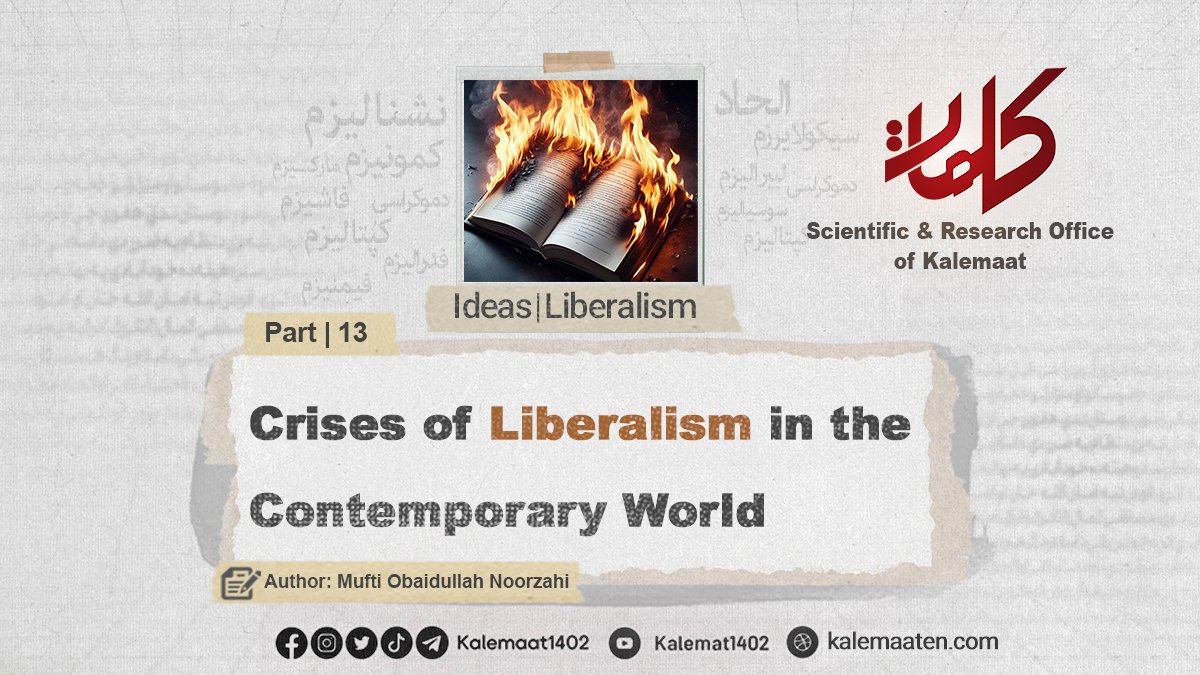
Author: Mufti Obaidullah Noorzahi
Crises of Liberalism in the Contemporary World (Part 13)
The Difference Between Liberalism and Democracy
First Difference:
Liberalism, in brief, is a political paradigm with one ideal and two main principles. The central ideal of liberalism—which determines the ultimate goal of every liberal in politics—is the attainment of maximum possible and responsible individual freedom and autonomy in society. To achieve this maximum freedom, liberalism advocates two principles:
a) The separation of society from the domain of government;
b) Limiting the power of government through law and individual rights and freedoms.
On the other hand, democratic thought seems to be based on three fundamental foundations, and the definition of democracy must be sought within these three principles:
a) Popular sovereignty (recognizing the people’s right to appoint, criticize, and remove the government and to make decisions on public matters);
b) Political equality of citizens (recognizing the equal right of all citizens to hold political positions, participate in public decision-making, and oversee the government);
c) Majority rule with the protection of fundamental minority rights (acting based on the majority’s opinion in case of disputes without eliminating the possibility for the minority to become the majority in the future).
Second Difference:
Liberalism is a modern idea and phenomenon, while democracy is an ancient one. Therefore, one can speak of ancient and modern democracy, but not of ancient liberalism. Modern liberalism is not compatible with ancient democracy. Although formal democracy (in its legal-institutional sense), whether ancient or modern, is not in conflict with liberalism, content-based ancient democracy is incompatible with liberalism.
Third Difference:
Thinkers and political activists have pursued two fundamental demands in the political arena: the desire to limit power and the desire to distribute power. Democracy is a response to the fundamental demand for the distribution of power, while liberalism is a response to the fundamental demand for the limitation of power.
Fourth Difference:
Whether in material or spiritual matters, liberalism considers individual freedom as freedom against the state and defends it. In fact, liberalism deals with the inward-oriented aspect of the individual. In contrast, democracy seeks to reconcile the individual with society by building a community based on mutual consensus, and thus deals with the outward-oriented aspect of the individual.
In liberalism, the individual initiates any action that occurs outside the scope of government intervention; but in democracy, the individual supports a different kind of government—one in which collective decision-making is in the hands of the people themselves or their chosen representatives.
Fifth Difference:
Since in both liberalism and democracy, the government is not inherently limited and has no clearly defined boundaries, two types or aspects of limitation on government can be discussed:
a) Limitation of government authority.
b) Limitation of government functions.
A government that is limited in authority is called a “limited government,” while one that is limited in function is called a “minimal government.” The government envisioned by liberalism is both limited and minimal. However, a democracy can exist where the government, though limited, is not necessarily minimal—a government with diverse functions but constrained by the constitution and legal procedures.
Sixth Difference:
Both liberalism and democracy consider themselves defenders and guarantors of freedom. Freedom is of two kinds: negative and positive.
In the negative interpretation, individual freedom is secured when there are no obstacles or restrictions preventing one from expressing opinions or pursuing personal goals and desires. In fact, negative freedom exists when a person experiences autonomy without limitations.
Liberalism’s interpretation of freedom is negative. The dominant liberal view of freedom is freedom from the government—meaning more freedom equals less government intervention in individual affairs.
In contrast, the positive interpretation of freedom emphasizes that if a person lacks the ability or means to exercise their freedom, then the presence or absence of obstacles is not the main issue. Positive freedom refers to the kind of liberty one possesses when capable of pursuing certain goals or activities.
Liberals, who are often concerned with government interference in various affairs, emphasize negative freedom and oppose increasing government power in the name of positive freedom. However, there is no reason to view democracy solely as a defender of the negative interpretation of freedom or as indifferent or opposed to positive freedom.
The view that negative and positive freedoms are mutually exclusive—and that pursuing one contradicts the pursuit of the other—is based on a liberal presupposition regarding power and freedom.
Continues…


